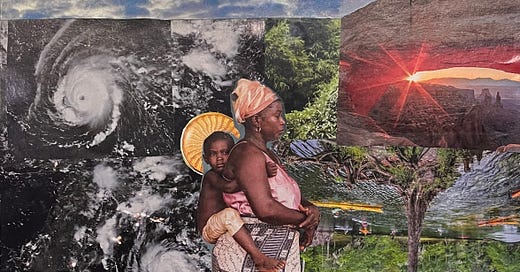By honoring the knowledge in the land, and caring for its keepers, we start to become Indigenous to place. – Robin Wall Kimmerer
“Rewilding is a form of ecological restoration aimed at increasing biodiversity and restoring natural processes. It differs from other forms of ecological restoration in that rewilding aspires to reduce human influence on ecosystems” (“Rewilding” n.d.)
Are you indigenous to Detroit? Have you ever imagined what our city looked like before the streets? Before the bricks and steel? Before the grind? There were old-growth forests. Native plants and trees. Clean, fresh water. I know we aren’t returning to pre-colonial times, but we can imagine – imagine how we emerge from these nightmares of another man’s making by just remembering. We currently live in a post-industrial warzone that pollutes the land that we know is sacred; this wasn't always the situation.
Waawiyaatanong is the Anishinaabe name for the place we now call Detroit – It means, “where the river bends” – a beautiful ode to the lifeway of the Detroit River. We remember that before Africans arrived in Detroit, mostly by way of the Great Migration, and the colonists arrived from France and Great Britain, there were the Anishinaabe who were The First Peoples to steward this land.
We must increase reliance on some indigenous wisdom; those knowledges so long disconnected from our Collective Consciousness of which flourished with sacred understanding(s) and practice(s) of land stewardship in times before colonization, slavery, and genocide. How if we knew Detroit – the plants and animals, and people, that first inhabited this land, we might have a better relationship with this wondrous place.
We cannot rely on the history that has been told about America “the great?” Many of us recognize the injustices of European settler-colonialism that continues to perpetrate great violence and harm to the land indigenously known as Turtle Island, nevertheless we resist the empire.
This call to decolonize our minds and bodies, means decolonizing the land too. When we reflect, we know that without the land we are nothing. The land provides our food, shelter, and numerous other living resources. This is our Mother Earth. A call for resource mobilization is about building RELATIONSHIPS with our greatest resource which means honoring and shepherding the land and those who inhabit it and depend on it.
The inherent wealth of this sacred land has been perverted by colonial ideologies therefore causing industry leaders to covet, gatekeep, and manipulate precious natural resources and materials, and attain their wealth by extractive means; extractive agriculture; extractive industry; extractive politics. Our city, where concentrated industry extracts labor from Black folks, also causes the raw materials of this land to be unable to persist as-is. We’ve come to recognize that automobiles harm this land, and air, by polluting it and extracting fossil fuels and heavy metals from the ground.
“Just Transition is a vision-led, unifying and place-based set of principles, processes, and practices that build economic and political power to shift from an extractive economy to a regenerative economy. After centuries of global plunder, the profit-driven, growth-dependent, industrial economy – rooted in the myth of white supremacy, heteropatriarchy, consumerism, and ableism – is severely undermining the life support systems of the planet. An economy based on extracting from a finite system faster than the capacity of the system to regenerate will eventually come to an end—either through collapse or through our intentional re-organization. Transition is inevitable. Justice is not.”
–Movement Generation
We recognize our complicity in these extractive economies… What must be done, you ask? Imagining a future where capitalism does not leave so much taken from the Earth and our people. We need a Just Transition away from it in order to build and sustain regenerative economies.
According to the Climate Justice Alliance, a Just Transition requires Regenerative Ecological Economics and “this requires a re-localization and democratization of primary production and consumption by building up local food systems, local clean energy, and small-scale productions that are sustainable economically and ecologically.”
A Just Transition is having the courage to take the land back. Don’t get me wrong, land ownership and private property is the white supremacist view of land control. The land is living, and to own it is to subscribe to the ecological extraction which my ancestors and I know all too well. We must imagine how we steward this land so that what we need is provided regeneratively. We must rewild our imaginations to remember that if we take care of the land, it will take care of us.
I’m so proud to be from Detroit because our people know that nurturing and respecting the land is the way. Look at the systems of urban farms and gardens. Look at the growing food sovereignty movement, especially the work of the Detroit Black Community Food Sovereignty Network (DBCFSN) and Feedom Freedom Growers. Look at the work of your neighbors rewilding their yards by bringing habitats for our pollinators with native plants (shoutout to the Monarch Butterflies that have returned to my block). We know what must be done and what must be at the base of our work.
Detroiters (The People of Waawiyaatanong) know how to resist and how to imagine new futures. Our future is to organize toward Land Rematriation. Sikowis Nobiss of the Nêhiyaw/Saulteaux peoples said to ReMatriate land “is a call to reestablish Indigenous landscapes, bring back Indigenous traditional ecological knowledge and to give stolen power back to the feminine.”
It won’t simply be ‘buying up the block’ and repackaging capitalism; our work must be in building relationships with each other and the land in order to defend and steward her. My greatest imagining is that we #TakeTheLandBack.






